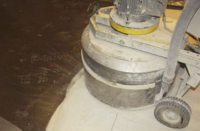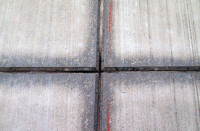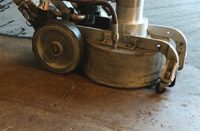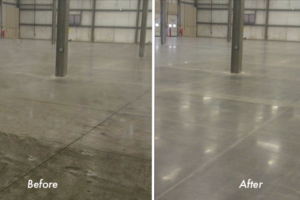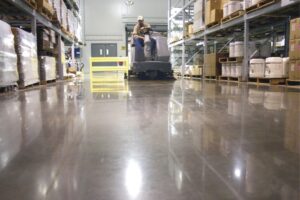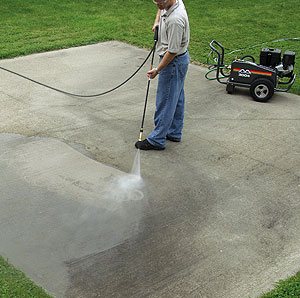 … both a workhorse and a magic wand for the decorative concrete contractor
… both a workhorse and a magic wand for the decorative concrete contractor
The pressure washer is one of the most useful and versatile tools available to the decorative concrete contractor. As with most tools of the trade, a pressure washer in the hands of a pro becomes a magic wand, while in the hands of a novice it can ruin your newly created surface. For most professional contractors the upside far exceeds the downside.
When you buy a pressure washer, you buy psi. This means the low-end pressure washer is little more than a glorified garden hose with 700 psi to 1,000 psi. Stated simply, the psi of a washer determines how effectively it breaks the bond between the debris and the surface. For concrete and industrial uses, the washers of choice offer at least 2,000 psi, and preferably 3,000 psi. In a contractor environment, a pressure washer sees plenty of action, often daily. This continuous use eliminates the residential-type washer as a viable tool for the professional.
A second measure of pressure-washer effectiveness is water flow, measured in gallons per minute (gpm). The water flow affects the time it takes to clean a surface. A serious industrial-grade pressure washer has a gpm of 3.5 up to 4.4.
 A pressure washer is driven either by direct drive or a belt drive. In an industrial environment, the longevity of the belt drive makes it the clear winner for the professional contractor. The belt drive allows for much higher flow rates, up to 5 or 6 gpm, and because the pump is located away from the heat of the engine, it requires less maintenance such as oil changes.
A pressure washer is driven either by direct drive or a belt drive. In an industrial environment, the longevity of the belt drive makes it the clear winner for the professional contractor. The belt drive allows for much higher flow rates, up to 5 or 6 gpm, and because the pump is located away from the heat of the engine, it requires less maintenance such as oil changes.
The top-of-the-line industrial pressure washers offer quick-connect nozzles with spray alternatives of 0, 15, 25 and 40 degrees. The know-how to select and adjust the proper nozzle for the job is where the experienced contractor shines. The 0-degree nozzle used at full throttle at close range can etch a groove in concrete — generally not a desirable outcome. By attaching a rotating nozzle, the 0-degree flow is dispersed over the 25-degree area, which can remove a parking stripe in one pass.
The decorative concrete contractor often uses a pressure washer to prepare the surface or rinse the finished surface of a job. The versatility of a pressure washer shines in these two very different applications. The concrete surface left after adjacent construction trades are finished is often marred, scarred and caked with dirt, grime and who knows what. The preparation of this surface requires high psi throwing a high gallon-per-minute to the task. On the other hand, rinsing newly applied color requires a delicate touch to clean off the surface while not blowing the color off the finished job. Once the color has been applied and rinsed, color cannot be reapplied. Color can be removed, but more color cannot be added. You want your most experienced technician to pressure-wash the finished surface.
The rotary surface cleaner is an overlooked accessory that combines water pressure with a hardy bristle brush to clean or rinse decks, patios, driveways or any horizontal surface. Rotary surface cleaners are available with 18-inch or 28-inch diameters and psi ratings of 3,000 and 4,000. The water pressure can be adjusted through the pressure washer unit.
As with all tools of the trade, your pressure washer cost is calculated by quality work completed on time and the subsequent word-of-mouth business. A pressure washer is a necessary, important tool for the professional decorative concrete contractor; it pays to purchase the most power and versatility you can fit into your budget. Train your most experienced workers in its use, and most importantly, test your nozzle’s performance in an inconspicuous location before turning it loose on the concrete leading up to your customer’s front door.
